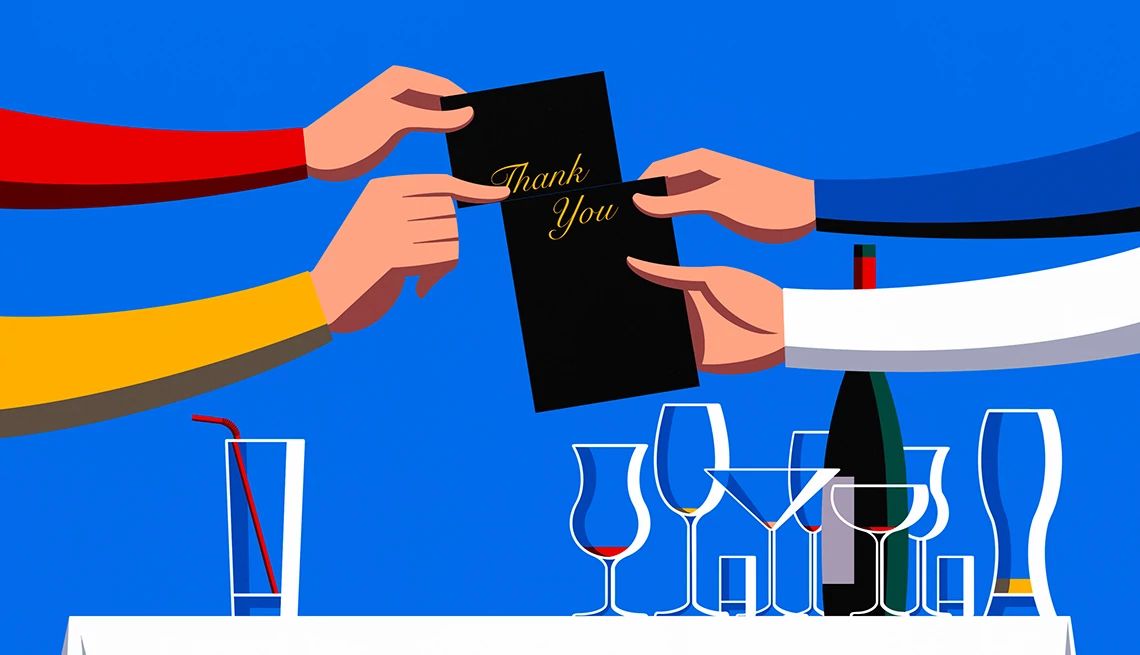AARP Hearing Center


Dining out with friends can bring people closer and make for an enjoyable experience. And many of us do, with nearly three out of 10 Americans reporting that they eat out once a week or more, a recent survey found.
However, with restaurant prices increasing — up 3.6 percent from November 2023 to November 2024 — and dining budgets tightening, some of us are choosing to forgo alcohol when we eat out, whether to save money or to reap the health benefits of drinking less.
Which raises the question: Who pays the bill when drinkers and non-drinkers dine together?
My wife and I enjoy going out to dinner with another couple, but there’s an issue. We don’t drink, but our friends do. They often order several cocktails or a bottle of wine for themselves, which adds a significant amount to the bill. We don’t think we should be responsible for splitting the check 50/50. Are my wife and I being total cheapskates?
Total cheapskates you are not.
I’d like to start off by saying that the good etiquette move is whenever someone orders more food or alcohol, they acknowledge it and offer to get separate checks. Traditional etiquette states that the person who extends the dinner invitation foots the bill. But that's often not how we organize a dinner out with friends — we typically make plans more casually, and we often don’t discuss how the bill will be handled until the check arrives.
I also want to reassure you that this is a common issue — and your friends might not even be aware that they’re putting you in an awkward position.
Often, people simply don’t notice that they ordered more food or drinks than their dining companions. Also, a growing number of people are abstaining from alcohol, whether as a permanent lifestyle choice or as part of a no-alcohol challenge like Dry January. (See a list of Dry January dos and don’ts below.)


Money Manners
Lizzie Post is AARP's financial etiquette columnist. She is the great-great-granddaughter of etiquette legend Emily Post. She’s also the co-president of The Emily Post Institute, co-author of Emily Post’s Etiquette: the Centennial Edition and co-host of the Awesome Etiquette podcast.
Many of us are also tightening our dining budgets and cutting out drinks as a way to curb costs amid rising restaurant prices.
Given that you’ve already encountered this issue with your friends several times, I recommend addressing the topic before your next outing. This way, everyone goes into the meal knowing what to expect.
Be concise: “I know in the past we’ve split the bill, but since Allison and I aren’t drinking, we’d love to grab separate checks.” If you forget to broach the topic in advance, you can use the same line at the end of the meal.
Wanting a fair split isn’t cheap, so don’t feel embarrassed or awkward asking for separate checks. It’s a perfectly reasonable request — and if your friends balk, maybe it’s best to do at-home meals with them.
5 Dry January Dos and Don'ts
Taking a break from alcohol — even for one month — can come with some health perks. A study published in the medical journal BMJ found that participants who gave up alcohol for 30 days saw improvements in their weight, blood pressure, insulin resistance levels and cancer-related growth factors. Other research has found that people who stop drinking for a month experience more energy and better sleep.
Interested in giving the month-long “Dry January” challenge a try? Here are five tips:
Do find a good nonalcoholic substitution. Gone are the days when water, soda or a sugary mocktail were the only options. The nonalcoholic market is booming, and more and more companies are bringing alcohol-free beers, wines, spirits and spritzes to the market. Explore the alternatives and find something you like, the health care providers at Massachusetts General Hospital suggest.
Do identify why you drink alcohol. Is it social? Is it to unwind? Think about why you drink in the first place and how you could accomplish these goals without alcohol, says the National Institute on Alcohol Abuse and Alcoholism, part of the National Institutes of Health (NIH). Maybe a yoga session can replace your nightly wine, or a game night with friends could sub in for happy hour.
Don’t keep it a secret. Let your friends and family know you’re participating in Dry January, the NIH says. They can help hold you accountable, and they may even decide to join you.
Don’t keep alcohol at home. According to the folks at Harvard Health Publishing, it’s best to not have the temptation around.
Do give yourself a break if you slip up. Don’t quit; just start again the next day, health experts say.
— Rachel Nania



































































You Might Also Like
Our Grown Son Still Lives With Us. Should We Charge Him Rent?
More twenty-something 'boomerang kids' are moving back home with their parents. Some don't want to leave
I Want to Ask My Fiancé to Sign a Prenup, But I'm Nervous to Bring It Up
Our etiquette expert offers advice for older couples on how to address this touchy subject
My Grandkids Don't Thank Me for Gifts. What Should I Do?
One doting grandparent's struggle — and our new money etiquette columnist's advice